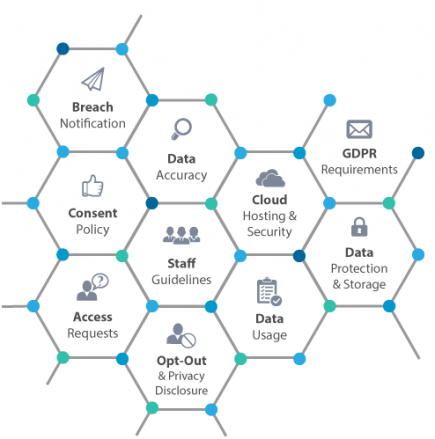Analyze
Analyze processing in a single system, simplifying data management, governance, classification, and oversight.
Protect
Protect data with industry leading encryption and security technology that’s always up-to-date and assessed by experts.
Comply
Utilize services that already comply with complex, internationally-recognized standards to more easily meet new requirements.
What is GDPR?
Global Data Protection Regulations known as GDPR will be effective from 25th May 2018. GDPR is regulation in EU law on data protection and privacy for all individuals within the European Union. The GDPR aims primarily to give control to citizens and residents over their personal data and to simplify the regulatory environment for international business by unifying the regulation within the EU.
The GDPR extends the scope of EU data protection law to all foreign companies processing data of EU residents. It provides for a harmonization of the data-protection regulations throughout the EU, thereby making it easier for non-European companies to comply with these regulations; however, this comes at the cost of a strict data-protection compliance regime with severe penalties of up to 4% of worldwide turnover or €20 million, whichever is higher.

GDPR Readiness Review
GDPR readiness review act will introduce the biggest changes to data protection law in Europe.
GDPR Readiness Review
GDPR readiness review act will introduce the biggest changes to data protection law in Europe.
GDPR Compliance
Understanding the GDPR is most important aspect of GDPR compliance
GDPR Training
Organisations will need to be compliant with the new rules and should act immediately.
Data Protection Principles
1
Lawfulness, Fairness and Transparency
The first principle is relatively self-evident as organisations need to make sure their data collection practices don’t break the law and that they aren’t hiding anything from data subjects. Understanding of GDPR and its rules is essential for data collection, data transparency with data subjects.
2
Purpose Limitation
Organisations should only collect personal data for a specific purpose, clearly state what that purpose is and only collect data for as long as necessary to complete that purpose. Processing that’s done for archiving purposes in the public interest or for scientific, historical or statistical purposes is given more freedom.
3
Data Minimization
Data processing of personal data by the organisation need to achieve only for processing purposes. Data minimisation will help to restrict unauthorised individual in the event of a data breach, & only have access to a limited amount of data.
4
Accuracy
The accuracy of personal data is integral of data protection. The GDPR states that “every reasonable step must be taken” to erase or rectify data that is inaccurate or incomplete. Individuals have the right to request that inaccurate or incomplete data be erased or rectified within 30 days.
5
Storage Limitation
GDPR regulations directs organisations to delete personal data when it’s no longer necessary. The requirement of retention of data will vary between industries and the reasons that data is collected. Any organisation that is uncertain how long it should keep personal data should consult a legal professional.
6
Integrity and Confidentiality
Integrity and confidentiality principle deals explicitly with data security. The GDPR states that personal data must be “processed in a manner that ensures appropriate security of the personal data, including protection against unauthorised or unlawful processing ”.
Ready To Discuss Your Project?
There are many ways to contact us. You may drop us a line, give a call or send an email, choose what suits you the most.
Data Protection Principles
- Creating a data inventory that identifies processors and any data that’s held unlawfully.
- GDPR Consultants will conduct a data flow audit for personal data and data processing.
- Govern on personal data starts with being able to define what personal data means and then share this understanding across your organization.
- Perform a gap analysis to assess your compliance, according to your business processes.
- Conduct a data protection impact assessment and a security gap analysis.
- Consulting for implementing of governance framework ISO 27001 or Cyber Essentials.

© 2018. All Rights Reserved | Designed By Cetreno Infotech Pvt Ltd.